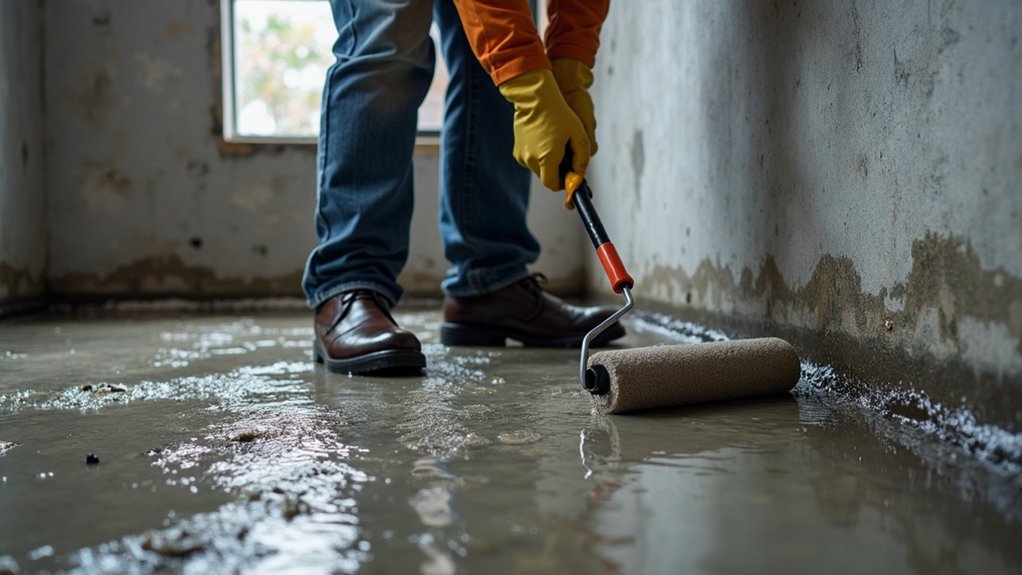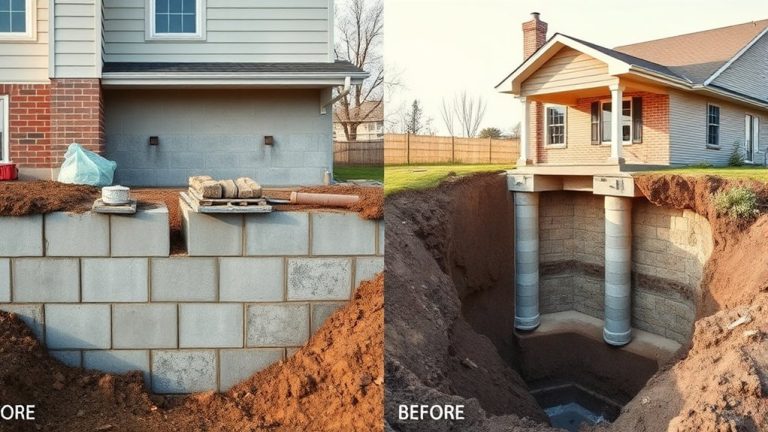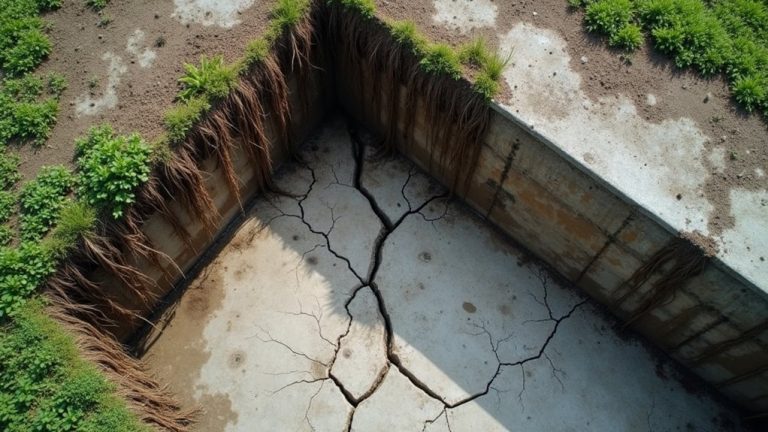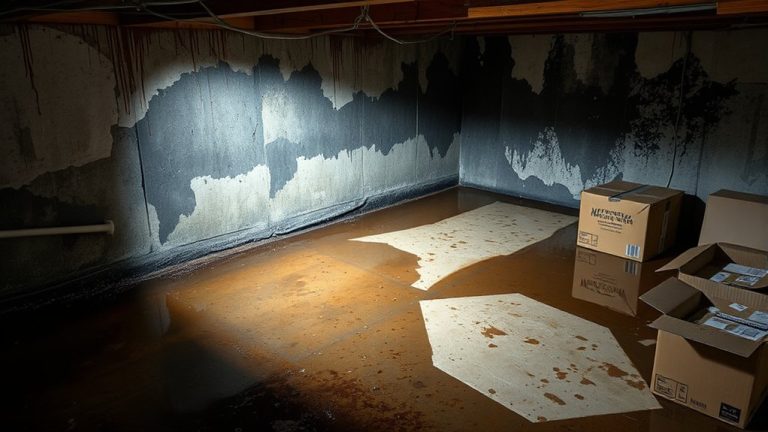Are you tired of a damp, musty basement that threatens your home's foundation? You're not alone. Waterproofing might seem intimidating, but many homeowners successfully tackle this project themselves. With the right approach, tools, and techniques, you can protect your basement from water damage and create a dry, safe space. Curious about how to get started? Let's investigate the tactics that can revolutionize your wet basement into a robust part of your home.
Key Takeaways
- DIY basement waterproofing is possible for minor moisture issues using sealants, waterproofing paint, and proper surface preparation.
- Small foundation cracks and interior seepage can typically be addressed through self-applied hydraulic cement and specialized waterproofing coatings.
- Complex water intrusion problems requiring extensive excavation or drainage system modifications usually demand professional intervention and specialized equipment.
- Essential DIY waterproofing tools include protective gear, concrete patching kits, masonry caulk, waterproof sealants, and appropriate application tools.
- Successful self-waterproofing depends on accurately identifying water source, selecting appropriate materials, and meticulously following manufacturer's application instructions.
Understanding Water Intrusion Types in Basements
If you're dealing with a wet basement, understanding the types of water intrusion is your first defense against potential damage. Moisture sources can range from surface runoff to groundwater pressure, each presenting unique challenges.
You'll want to identify seepage through careful inspection, looking for tell-tale signs like damp walls, water stains, or pooling on the floor. Cracks in foundation walls, poorly sealed windows, and inadequate drainage can all contribute to water problems. By recognizing these different intrusion types, you'll be better equipped to tackle basement waterproofing effectively and protect your home from potential water damage. Drain tile solutions can help relieve pressure from underneath and around the foundation, eliminating water from entering through floor cracks.
Essential Tools and Materials for DIY Waterproofing
Once you've pinpointed your basement's water intrusion points, gathering the right tools and materials becomes your next strategic move. You'll need waterproof sealant, masonry caulk, hydraulic cement, waterproofing paint, and protective gear like gloves and safety glasses.
Your moisture barrier installation requires specific tools: a paint roller, paintbrush, caulking gun, and trowel. Quality sealant application techniques demand precision and patience. Consider purchasing a concrete patching kit and plastic sheeting to address potential cracks and vulnerable areas.
Dangerous foundation cracks can develop if water damage and moisture problems are not addressed promptly, making thorough waterproofing essential for maintaining your home's structural integrity.
Proper preparation and the right supplies can convert your waterproofing project from formidable to manageable.
Interior Waterproofing Techniques You Can Apply
Three proven interior waterproofing techniques can help homeowners combat basement moisture without expensive professional intervention. You'll want to focus on solutions that protect your space and prevent water damage.
Your key strategies include:
- Applying concrete sealants to block moisture penetration
- Installing waterproof coatings on interior walls
- Using specialized waterproofing paint for all-encompassing protection
These methods aren't just cost-effective; they're powerful ways to take control of your basement's environment. By investing a little time and effort, you can alter a damp, vulnerable space into a dry, secure area that preserves your home's structural integrity and gives you peace of mind.
Exterior Foundation Waterproofing Methods
While interior waterproofing techniques offer solid protection, addressing water issues from the outside of your foundation can provide even more thorough defense against moisture intrusion. You'll want to ponder applying concrete wall coatings and below grade waterproofing membranes to create a reliable barrier.
These exterior methods can help prevent water from seeping into your basement walls, reducing the risk of structural damage and mold growth. By carefully excavating around your foundation and applying professional-grade waterproofing materials, you can drastically improve your home's moisture resistance and protect your investment.
Drainage Solutions to Prevent Water Accumulation
Many homeowners struggle with water pooling around their foundation, which can lead to serious basement moisture problems. To protect your home, consider these drainage solutions:
- French drain installation along your foundation's perimeter
- Subsurface drainage pipes that redirect water away from your home
- Grading your terrain to slope away from the foundation
When to Call a Professional Waterproofing Expert
Despite your best DIY efforts, some basement waterproofing challenges require professional intervention. If you're noticing persistent signs of water damage, like recurring moisture, mold growth, or foundation cracks, it's time to call an expert.
Professionals perform thorough inspection requirements that go beyond surface-level assessments. They'll diagnose complex drainage issues, identify hidden structural problems, and recommend targeted solutions. They've got specialized equipment and skill to tackle severe water intrusion scenarios that DIY methods can't effectively resolve.
Your home's long-term structural integrity depends on timely, professional waterproofing interventions.
Frequently Asked Questions
Can Waterproofing Paint Completely Solve Basement Moisture Problems?
You'll find waterproofing paint can't fully solve moisture issues. While it provides some concrete sealant effectiveness, it won't control basement humidity exhaustively or address underlying water infiltration problems.
How Much Does DIY Basement Waterproofing Typically Cost?
DIY basement waterproofing material costs range from $500 to $3,000, depending on your project's scope. You'll save money, but consider professional assistance for complex issues that might require specialized skills.
Will Homeowners Insurance Cover Water Damage From Basement Leaks?
Your homeowners liability coverage won't typically cover basement water damage from gradual leaks. You'll need professional moisture inspections to document sudden, accidental water intrusion for potential insurance claims.
How Long Does a DIY Waterproofing Project Usually Take?
Your waterproofing timeline depends on complexity, but most DIY projects take 2-3 days. You'll need proper preparation, materials, and patience to successfully seal and protect your basement from moisture intrusion.
Are There Any Environmental Concerns With Waterproofing Chemicals?
You'll need to ponder chemical toxicity and environmental impact, ensuring eco-friendly products that won't harm groundwater or soil. Choose biodegradable solutions that minimize ecological disturbance while protecting your basement effectively.



